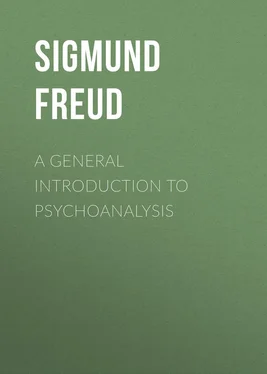Sigmund Freud - A General Introduction to Psychoanalysis
Здесь есть возможность читать онлайн «Sigmund Freud - A General Introduction to Psychoanalysis» — ознакомительный отрывок электронной книги совершенно бесплатно, а после прочтения отрывка купить полную версию. В некоторых случаях можно слушать аудио, скачать через торрент в формате fb2 и присутствует краткое содержание. Жанр: psy_theraphy, foreign_psychology, foreign_antique, foreign_prose, на английском языке. Описание произведения, (предисловие) а так же отзывы посетителей доступны на портале библиотеки ЛибКат.
- Название:A General Introduction to Psychoanalysis
- Автор:
- Жанр:
- Год:неизвестен
- ISBN:нет данных
- Рейтинг книги:4 / 5. Голосов: 1
-
Избранное:Добавить в избранное
- Отзывы:
-
Ваша оценка:
- 80
- 1
- 2
- 3
- 4
- 5
A General Introduction to Psychoanalysis: краткое содержание, описание и аннотация
Предлагаем к чтению аннотацию, описание, краткое содержание или предисловие (зависит от того, что написал сам автор книги «A General Introduction to Psychoanalysis»). Если вы не нашли необходимую информацию о книге — напишите в комментариях, мы постараемся отыскать её.
A General Introduction to Psychoanalysis — читать онлайн ознакомительный отрывок
Ниже представлен текст книги, разбитый по страницам. Система сохранения места последней прочитанной страницы, позволяет с удобством читать онлайн бесплатно книгу «A General Introduction to Psychoanalysis», без необходимости каждый раз заново искать на чём Вы остановились. Поставьте закладку, и сможете в любой момент перейти на страницу, на которой закончили чтение.
Интервал:
Закладка:
If the meaning of this forgetting of projects leaves room for so little doubt among laymen, you will be less surprised to find that poets make use of these errors in the same sense. Those of you who have seen or read Shaw's Caesar and Cleopatra will recall that Caesar, when departing in the last scene, is pursued by the idea that there was something more he intended to do, but that he had forgotten it. Finally he discovers what it is: to take leave of Cleopatra. This small device of the author is meant to ascribe to the great Caesar a superiority which he did not possess, and to which he did not at all aspire. You can learn from historical sources that Caesar had Cleopatra follow him to Rome, and that she was staying there with her little Caesarion when Caesar was murdered, whereupon she fled the city.
The cases of forgetting projects are as a rule so clear that they are of little use for our purpose, i.e., discovering in the psychic situation circumstantial evidence of the meaning of the error. Let us, therefore, turn to a particularly ambiguous and untransparent error, that of losing and mislaying objects. That we ourselves should have a purpose in losing an object, an accident frequently so painful, will certainly seem incredible to you. But there are many instances similar to the following: A young man loses the pencil which he had liked very much. The day before he had received a letter from his brother-in-law, which concluded with the words, "For the present I have neither the inclination nor the time to be a party to your frivolity and your idleness." 14 14 From B. Dattner.
It so happened that the pencil had been a present from this brother-in-law. Without this coincidence we could not, of course, assert that the loss involved any intention to get rid of the gift. Similar cases are numerous. Persons lose objects when they have fallen out with the donors, and no longer wish to be reminded of them. Or again, objects may be lost if one no longer likes the things themselves, and wants to supply oneself with a pretext for substituting other and better things in their stead. Letting a thing fall and break naturally shows the same intention toward that object. Can one consider it accidental when a school child just before his birthday loses, ruins or breaks his belongings, for example his school bag or his watch?
He who has frequently experienced the annoyance of not being able to find something which he has himself put away, will also be unwilling to believe there was any intent behind the loss. And yet the examples are not at all rare in which the attendant circumstances of the mislaying point to a tendency temporarily or permanently to get rid of the object. Perhaps the most beautiful example of this sort is the following: A young man tells me: "A few years ago a misunderstanding arose in my married life. I felt my wife was too cool and even though I willingly acknowledged her excellent qualities, we lived without any tenderness between us. One day she brought me a book which she had thought might interest me. I thanked her for this attention, promised to read the book, put it in a handy place, and couldn't find it again. Several months passed thus, during which I occasionally remembered this mislaid book and tried in vain to find it. About half a year later my beloved mother, who lived at a distance from us, fell ill. My wife left the house in order to nurse her mother-in-law. The condition of the patient became serious, and gave my wife an opportunity of showing her best side. One evening I came home filled with enthusiasm and gratitude toward my wife. I approached my writing desk, opened a certain drawer with no definite intention but as if with somnambulistic certainty, and the first thing I found is the book so long mislaid."
With the cessation of the motive, the inability to find the mislaid object also came to an end.
Ladies and gentlemen, I could increase this collection of examples indefinitely. But I do not wish to do so here. In my Psychopathology of Everyday Life (first published in 1901), you will find only too many instances for the study of errors. 15 15 So also in the writings of A. Maeder (French), A. A. Brill (English) J. Stärke (Dutch) and others.
All these examples demonstrate the same thing repeatedly: namely, they make it seem probable that errors have a meaning, and show how one may guess or establish that meaning from the attendant circumstances. I limit myself to-day because we have confined ourselves to the purpose of profiting in the preparation for psychoanalysis from the study of these phenomena. I must, however, still go into two additional groups of observations, into the accumulated and combined errors and into the confirmation of our interpretations by means of subsequent developments.
The accumulated and combined errors are surely the fine flower of their species. If we were interested only in proving that errors may have a meaning, we would limit ourselves to the accumulated and combined errors in the first place, for here the meaning is unmistakable, even to the dullest intelligence, and can force conviction upon the most critical judgment. The accumulation of manifestations betrays a stubbornness such as could never come about by accident, but which fits closely the idea of design. Finally, the interchange of certain kinds of error with each other shows us what is the important and essential element of the error, not its form or the means of which it avails itself, but the purpose which it serves and which is to be achieved by the most various paths. Thus I will give you a case of repeated forgetting. Jones recounts that he once allowed a letter to lie on his writing desk several days for reasons quite unknown. Finally he made up his mind to mail it; but it was returned from the dead letter office, for he had forgotten to address it. After he had addressed it he took it to the post office, but this time without a stamp. At this point he finally had to admit to himself his aversion against sending the letter at all.
In another case a mistake is combined with mislaying an object. A lady is traveling to Rome with her brother-in-law, a famous artist. The visitor is much fêted by the Germans living in Rome, and receives as a gift, among other things, a gold medal of ancient origin. The lady is vexed by the fact that her brother-in-law does not sufficiently appreciate the beautiful object. After she leaves her sister and reaches her home, she discovers when unpacking that she has brought with her – how, she does not know – the medal. She immediately informs her brother-in-law of this fact by letter, and gives him notice that she will send the medal back to Rome the next day. But on the following day, the medal has been so cleverly mislaid that it can neither be found nor sent, and at this point it begins to dawn upon the lady that her "absent-mindedness" means, namely, that she wants to keep the object for herself. 16 16 From R. Reitler.
I have already given you an example of a combination of forgetfulness and error in which someone first forgot a rendezvous and then, with the firm intention of not forgetting it a second time, appeared at the wrong hour. A quite analogous case was told me from his own experience, by a friend who pursues literary interests in addition to his scientific ones. He said: "A few years ago I accepted the election to the board of a certain literary society, because I hoped that the society could at some time be of use to me in helping obtain the production of my drama, and, despite my lack of interest, I took part in the meetings every Friday. A few months ago I received the assurance of a production in the theatre in F., and since that time it happens regularly that I forget the meetings of that society. When I read your article on these things, I was ashamed of my forgetfulness, reproached myself with the meanness of staying away now that I no longer need these people and determined to be sure not to forget next Friday. I kept reminding myself of this resolution until I carried it out and stood before the door of the meeting room. To my astonishment, it was closed, the meeting was already over; for I had mistaken the day. It was already Saturday."
Читать дальшеИнтервал:
Закладка:
Похожие книги на «A General Introduction to Psychoanalysis»
Представляем Вашему вниманию похожие книги на «A General Introduction to Psychoanalysis» списком для выбора. Мы отобрали схожую по названию и смыслу литературу в надежде предоставить читателям больше вариантов отыскать новые, интересные, ещё непрочитанные произведения.
Обсуждение, отзывы о книге «A General Introduction to Psychoanalysis» и просто собственные мнения читателей. Оставьте ваши комментарии, напишите, что Вы думаете о произведении, его смысле или главных героях. Укажите что конкретно понравилось, а что нет, и почему Вы так считаете.












